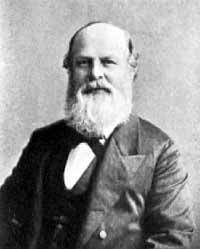Articles from the Thoroton Society Newsletter
Henry Ashwell

Henry Ashwell (1828-1909) was one of nineteen children fathered by John Ashwell (1771-1838); twelve being from Henry’s mother and seven from his step-mother. Henry’s father was a fine example of what could, or couldn’t, be achieved and was, at different times, an ironmonger, iron founder, farmer and accountant before becoming Chamberlain, and Sheriff, of Nottingham, a Justice of the Peace, Deputy Mayor and a thrice-time Mayor. His questionable career choices, all before the birth of Henry, were followed by bankruptcy, a £3,000+ cost to the Corporation and his enforced retirement from office. Uncles offered career opportunities but some chose to achieve merit in one field of employment rather than a variety.
Henry Ashwell was educated at the Proprietary School in Leicester, under the tutelage of Cyrus Edmonds, the headmaster, who later married one of his sisters. Thereafter, Henry spent two years at Horton College (Bradford) in preparation for the ministry, ‘whilst imbibing dissenting ideas of religious freedom which guided him and to which he owed so much’. Eventually, his choice was an industrial career as, for his elder step-brothers, Thomas (1819-73) and George, both entering the textile industry as hosiery apprentices. In contrast, Henry was placed (at 14) with his uncle John Heard (17851865), one of Nottingham’s most important Merchant Hosiers, but later was offered, and accepted with relish, the ‘vests & pants’ wet-processing business on Radford Road in New Basford.
According to company note-paper, the business had been established in 1820, although a bleach-works was reputedly in operation before that time. In 1852, Henry took-over its management, became a partner in 1854 and was sole proprietor by 1855. With great assiduity and astute management he advanced its potential, immediately engaging architects for factory expansion. His early years were funded by his uncle but by the late 1860s he bought (for £6,250) the freehold property; with Marriot Ogle Tarbotton (the Corporation Surveyor & Engineer) acting as ‘Umpire’. By the 1870s the company had become a dye-works. Through shrewd investment and acceptable profitability, he ensured that wet-processing levels met the ever increasing production manufactured within the East Midlands.
Henry continued to buy land and property (e.g. Woodthorpe Grange) in his own right and, as proprietor, he made re-payments to his uncle as the profitability of the business provided both repayment and investment capital. In 1860, the company employed 70, in 1880 it reached 326 and was more than double (673) in the future of 1920. I & R Morley and J B Lewis became customers and the use of ‘Aniline Black’ brought a trade-mark, ‘Ashblak’, that was marketed for 45 years.
Henry’s youthful attraction to the ministry was followed by a deep interest in chapel work, especially foreign missions, of which he was a generous supporter. He was a Sunday school teacher for thirty six years and a founder member of the Derby Road Baptist Church (Nottingham), besides being a ‘hearty supporter’ of the Baptist Union. The Derby Road Baptist Church Jubilee Record 184797 notes that “he never considered his own ease and comfort when the work of the church was to be done”. Many other wet-processors (bleachers) had similar passions “for building and filling the churches and chapels” and whilst bleaching and chapel work seem somewhat incongruous they provided a basis for friendship and trust which were seen as preferable to legally enforceable safeguards. As such, he belonged to Nottingham’s Victorian elite and his business activities benefitted from the example he set.
The creation of the School Board saw Henry elected a member (1877) and serve on important committees; he became Vice-Chairman, introducing elementary science and awarding scholarships. In 1868, he spoke to the Chamber of Commerce about the deficiencies in technical education and, along with Mundella and Birkin, gave evidence before a committee of the House of Commons. When he retired from the School Board in 1887, the number of schools had increased from 3 to 27; but Henry watched with alarm the rapid progress being made in Germany and France in industry and the arts. Later, he became a Governor of the Nottingham High School.
He also became a member of the Basford Local Board, serving as an Overseer’s Guardian until its absorption by the Borough of Nottingham - working to improve street paving and lighting, street cleaning, sanitation, sewerage and the cemetery. He was elected to the Nottingham & Leen Valley Sewerage Board as Vice-Chairman and by 1877 the streets of Bulwell were provided with sewers, with drains connected to houses.
The establishment of the ‘New Unionism’ of 1889 inevitably led to the foundation of employers’ federations. Henry played a leading role as Chairman of the Masters’ Association where his opinion carried weight with few wishing to oppose him; his industrial relations always being conducted in an easy atmosphere. In January 1904, he celebrated his golden wedding anniversary with over 300, many long-serving, employees in attendance. One with 62 years’ service said “I have never known the time when we might not approach Mr Ashwell on any subject or when he would not listen to us with the greatest sympathy”.
Being an octogenarian, and perhaps taking his eye off the ball, Henry was forced to accept the appointment of a receiver in August 1908 for a claim instigated against Henry Ashwell & Company that related to irregularities in processed and merchanted mercerised cotton yarns. At that time of adversity, many of the old employees came forward with their bank accounts and placed them at the service of Mr Ashwell but by the October, the limited liability company was re-named the Nottingham Dyeing Co. Ltd, and then the Henry Ashwell & Co. (1908) Ltd some two months later. However, it was all too much and Henry died one year later. In 1924, the company was renamed Henry Ashwell & Co. Ltd, to be taken over, in 1973 by its chief competitor, the Springfield Hosiery Finishing company, in Bulwell.
George J. Murfet
< Previous